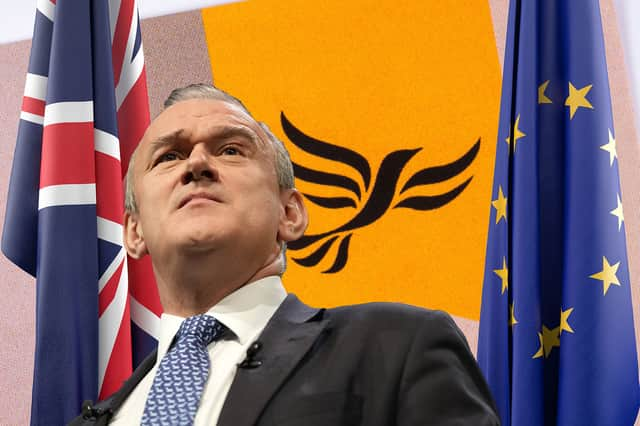Brexit: The Lib Dems are the only party that's not afraid to tackle our self-made economic disaster
and live on Freeview channel 276
During the Budget, Jeremy Hunt listed some of the economic headwinds which have buffeted the struggling UK economy. He mentioned the pandemic, the war in Ukraine and the resulting energy crisis, but for some reason the B word - Brexit - was missing.
Hunt and Rishi Sunak have repeatedly promised to grow the economy, yet so far it has been resistant - we are currently in a recession after all. Also promising to boost public services through growth is Keir Starmer and Labour. With Rachel Reeves’ fiscal rule of not borrowing to fund day-to-day spending gospel, Starmer is betting on GDP improving to bring about transformative changes to the country.
Advertisement
Hide AdAdvertisement
Hide AdHowever, he too does not want to talk about Brexit, and will not entertain any discussion about rejoining the EU. Only two parties, the Liberal Democrats and the Greens are alive to the reality of the damage that Brexit is doing to the economy.
At the Lib Dems’ spring conference at the weekend, Ed Davey reiterated his policy for the UK to return to the single market. “Only Liberal Democrats have a clear plan to rebuild this relationship with a better deal for Britain,” he said.
“To renew the ties of trust and friendship, to set us on the path back to the Single Market – our plan to repair the damage the Conservatives have done. And, in time, to restore Britain’s place at the heart of Europe, where we belong.”
He said Brexit was something “we can’t afford not to tackle head on… even if the other parties think it’s too difficult or too politically uncomfortable”. And he’s right, for the UK to achieve substantial economic growth which is needed to boost our ailing public services, struggling local authorities and under-pressure businesses, we need to look at rejoining the single market.
Advertisement
Hide AdAdvertisement
Hide Ad

At a macro level, the impact of Brexit is obvious. Since 2016, the EU’s economy has grown by 24% while the UK’s has only grown by 6%. Goldman Sachs, the US investment bank, estimates that Brexit has lost the economy 5% of growth, while goods trade is now the lowest in the G7.
On a micro level, businesses are feeling it every day. Fergus Corrigan, who runs Northern Lavender, the UK’s largest lavender field, says all the additional paperwork required to import from the EU takes up money and time.
“You do it yourself and it takes hours every time or you pay someone,” he told me. “That’s the thing for all of these imports and stuff - you just pay someone to do it. It’s not free trade - we’ve shot ourselves in the foot. We had this great thing where we could easily move our goods and now we can’t. It’s just another barrier, it’s just money - every single thing has to go up.”
It’s not only importers who are getting hit by additional red tape. Today, I reported how the price of wine is going to go up due to complex post-Brexit taxes being brought in. And last week, NationalWorld revealed how British farmers are unable to export beef to Australia, under the first free-trade agreement after Brexit, despite the Aussies sending 1,700 tonnes of beef the other way.
Advertisement
Hide AdAdvertisement
Hide AdThe issue the Lib Dems have at the moment, when making the argument against Brexit, is that people don’t want to think about it. In September 2019, it was the most important issue for 73% of voters, according to YouGov. Now that number has dwindled to 14%.
While Leavers and Remainers almost universally agree that Brexit has been handled terribly and is a pretty abject failure, it is very few people’s main voting issue. While polls regularly show support for rejoining the EU well above 50%, that doesn’t mean it’s these voters’ priority.
What pollsters tell me is that when they are asked directly, respondents favour rejoining the EU. However, that doesn’t necessarily mean it’s something they’re passionate about. Britons, by and large, are very apathetic about Brexit now.
The main issues at the moment are the economy and the cost of living crisis, closely followed by health. And these areas are interlinked with Brexit. If the economy improves there is more money for the NHS and other public services, however currently Brexit is like a deadweight holding Britain back. Over time, as it gets more and more obvious at the disastrous economic consequences of leaving the EU, people will link the cost of living crisis to Brexit. Until then the Lib Dems may have to wait.
Advertisement
Hide AdAdvertisement
Hide AdRalph Blackburn is NationalWorld’s politics editor based in Westminster, where he gets special access to Parliament, MPs and government briefings. If you liked this article you can follow Ralph on X (Twitter) here and sign up to his free weekly newsletter Politics Uncovered, which brings you the latest analysis and gossip from Westminster every Sunday morning.
Comment Guidelines
National World encourages reader discussion on our stories. User feedback, insights and back-and-forth exchanges add a rich layer of context to reporting. Please review our Community Guidelines before commenting.
